Speaking the target language outside the classroom in friendship groups
A comparative study of international and local modern foreign language students with a focus on employability.
Anita Fromm, Visiting Lecturer in English for Academic Purposes, Centre for Academic English, University of Hertfordshire

Abstract
Foreign language students at university in the UK, both international and local, do not appear to practise the target language much outside class nor form international friendships that would be positive for their learning, socialising and future employability. This article aims to firstly find out how much time such students spend speaking the target language outside class and consider why they infrequently intermingle to practise their language skills. It aims secondly to understand what helps and what hinders speaking and finally to relate their speaking habits to attitudes regarding employability. A learning behaviour questionnaire circulated as a pilot study at the University of Hertfordshire revealed that in both groups of students the respondents did not socialise very much outside class to speak the foreign language, felt shy about speaking it, lacked vocabulary or did not have enough time or opportunities. International students rated consideration of future employment possibilities relating to language practice and intercultural relationships as generally less important than local foreign language students. Suggestions show ways for tutors to encourage opportunities for multinational conversation outside the classroom.
Introduction
A large number of international students on Academic English Programmes, such as English for Academic Purposes (EAP) and International Foundation Programme (IFP) at the University of Hertfordshire (UH), seem to be failing to take up opportunities to speak English outside class as much as would be expected, given that they are currently living in the target language community. They do not appear to mix with British students or students of other nationalities very much; they mainly seem to form friendships among speakers of their own language or similar nationalities to their own. Although, there is apparently no previous research conducted at UH, a few studies examine relationships between different communities at other universities. Findings at Dublin City University reveal that many students are not aware of the value of intercultural contact at university (Dunne, 2009) and in Florida studies prove that those students who reported higher levels of social integration had better average marks (Massi et al, 2012).
This article compares international students learning English for their studies with local students learning foreign languages in the Language Subject Group (LSG) at UH. (Languages are an additional option alongside Business or Humanities subjects.) The rationale for this is that local students are unlikely to be immersed in the community of the foreign language they are studying, whereas international students would likely be at an advantage to be living in the language community of their studies. Speaking English outside class should help students improve their English. Conversely, the local students may have less opportunities to speak German, for example, and are likely to progress more slowly. Reynolds-Case (2013) maintains that even a brief period of six-weeks language study in the target language community is beneficial to foreign language acquisition.
When outside class, it would be helpful for students to make friends within the target language community rather than socialising with those who speak their own language. This should enhance their foreign language learning. If two or more students study together outside class they may be members of a friendship group. Importantly, when it comes to practising speaking the language, then speaking with someone is more likely to be more beneficial than learning alone. Policarpo (2015) states that friendship can have four meanings, which are 1) family-oriented, 2) trust–oriented, 3) self-oriented (also referred to as unconditional support), and 4) presence-oriented (understood as ‘being there’). Indeed, feeling trusted, giving and receiving support, and ‘being there’ for each other is very likely to have a positive impact on learning and speaking a foreign language. Furthermore, feelings of trust, support and ‘being there’ may be really useful in helping the learner/s feel more self-confident when speaking or preparing for a speaking assessment.
Three factors are important to note with regard to the challenges and benefits of intercultural exchanges and studying foreign languages. Firstly, to succeed in foreign language studies, it is essential that students practise speaking the language as much as possible. It helps to have friends to converse with and to join relevant Student Union societies (e.g. International or German societies). Rienties and Nolan (2014) have found that students at the University of Hawaii from different communities do not form similar co-national and international friendships. They conclude that interactions between international and host students did not become closer over time except with the help of tutor-led activities.
Secondly, it appears that some students are too shy to seek international friendships on their own accord for a variety of reasons, such as lack of vocabulary, cultural awareness or general confidence. Indeed, a Student Union survey in 2009 reveals that international students feel ‘isolated and alienated’ (National Union of Students, 2009: 5, in Gilbert, 2015). There are, nevertheless, solutions to improving such negative feelings among students. Gilbert (2015) recommends several ways to increase discussion and interactive work in class. These techniques are, for example, the use of more eye contact and inviting quieter individuals to speak, which have all been proven to work. A further suggestion here might be to encourage students to extend and explore these interactive techniques in activities outside class as well. This is significant because it demonstrates a need for tutors to create assignments where students may be obliged to meet peers of different nationalities to complete the assigned speaking tasks set. Furthermore, it could help students to intermingle and form new friendships with students who are not in the same class. Speaking practice in a small group situation can be of benefit to second language acquisition and improving competence even outside the classroom. In conversations, two or more speakers may be of varying levels of language ability, therefore some kind of ‘scaffolding’ may occur. One definition of scaffolding is ‘a temporary support system’ that assists an individual in a small group to perform at a higher level than without this support (Granott, 2005:144). Although, research discusses scaffolding related to in-class tutor led activities, it may be of relevance here. In a conversation, a speaker may naturally provide expressions where another stumbles. Thus, outside class conversations are usually very useful particularly for vocabulary learning and consolidation. One useful method is the use of peer assistants either in-class or outside. This can provide valuable support for language students. In addition, ‘it is hoped that the employability of the peer assistants will be enhanced by their experience of working with international students from a wide range of educational backgrounds and subject experience’ (Parry, 2015:2). It appears that many students at UH tend mostly to study alone in their rooms or library rather than exercising their speaking skills with others.
Thirdly, a university campus environment that motivates and rewards intercultural competence is necessary for an international curriculum and engagement between home and international students (Leask, 2009). To gain employment in an ever-increasing global economy it is essential for graduates to have high-level communication skills and work collaboratively in teams of multi-ethnic people (Diamond and Walkley et al., 2011). This is a very valid point; however, speaking foreign languages should be included here. Graduates who can prove genuine interest in foreign languages and cultures have a higher chance of being recruited. Besides academic success, many employers require excellent interpersonal skills, including intercultural relations and extra-curricular interests (Diamond and Walkley et al., 2011). Therefore, graduates need to show outside class activities in international friendship groups on their job applications. Finally, Crystal (2006) maintains that success in the world of business has become increasingly dependent on foreign language learning. Those young people who are able to communicate in another language have better employment opportunities and chances to travel, which widens experience.
The focus of this study is:
- To find out how much time international and local students spend intermingling to practise their language skills and make friends outside class.
- To find out what students consider hinders speaking outside class
- To find out what students consider helps speaking outside class
- To find out the degree of importance students attach to speaking languages, friendship and socialising in terms of their future employability.
It was anticipated that the results of this pilot study would be likely to reveal that international and local students are not speaking the target language enough outside class. This can imply these students do not form many international friendships with other students or spend much time with them. Furthermore, chances of future employment in international organisations might be reduced if students do not claim to intermingle very much with those of other nationalities. The data discussed in this short article has been limited to friends, classmates and peer-assistants. Therefore, the focus is on whether students are intermingling with each other. Some solutions for tutors to help encourage students to form international friendships and speak the target outside class are discussed.
Method
A learning behaviour questionnaire for this pilot study was circulated among 10 international students on Academic English foundation programmes (EAS and IFP) and 10 students studying German in the LSG at the University of Hertfordshire in March 2016. The questionnaire was voluntary and for self-completion. Closed and open questions focused on the amount of time students spend speaking the language outside class. The questions also asked students to consider what they think helps and what hinders speaking outside class. The student’s attitudes to speaking the foreign language and intermingling with other nationality students relating to employability were a further study aim reflected in the questionnaire.
All students in both subject areas can speak their respective target languages with some degree of fluency. The survey was conducted at the end of the second semester in 2016, which means there was some but not a great difference between the students’ L2 levels within and across both language groups. Language levels of the sample were roughly equivalent to CEFR (Common European Framework of Reference for Languages) B2 or IELTS (International English Language Testing System) 5.5 – 6.5 at the time of the survey. In the English studies group, there were five male and five female students; the German group consisted of two males and eight females. All of the German studies students were under 26; in the English group half were under 26. Four students (all EAS) were post-graduate students. The international cohort comprised the following first languages: 7 Arabic, 2 Chinese,1 Hindi/Guajarati. In the German group the following were spoken as first languages: 7 English, 1 Igbo,1 Polish, 1 Tamil. It is important to note that all students claimed to speak English fluently and only three respondents regarded English to be both their only fluent language and their first language. The others either considered additional languages apart from English to be fluent, which may or may not be their first language. Of the international respondents, all were living in the target language community, whereas local students studying German were living in England. Two of the German studies students had lived in Germany.
Results and Discussion
Time spent speaking the target language
Figures 1 and 2 show the percentage of time that students spend outside class speaking the target language. Quantitative results indicate that the majority of students do not speak the target language for more than 60% of the time outside class in either the international or local group (Figures 1 and 2). These results seem similar to the findings of Rienties and Nolan (2014), Dunne (2009) and Massi et al. (2012), claiming little time spent with different nationality students.
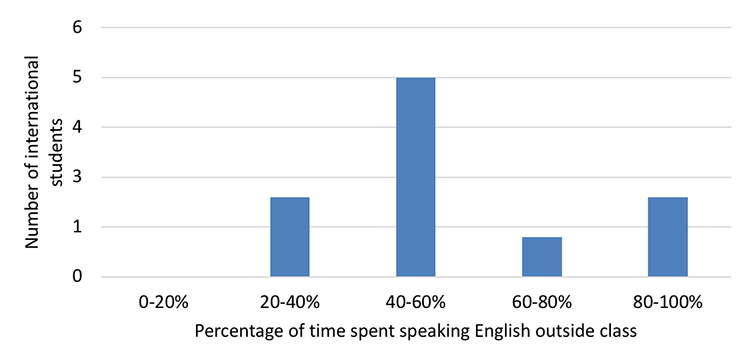
Figure 1. Time international students spent speaking English outside class.
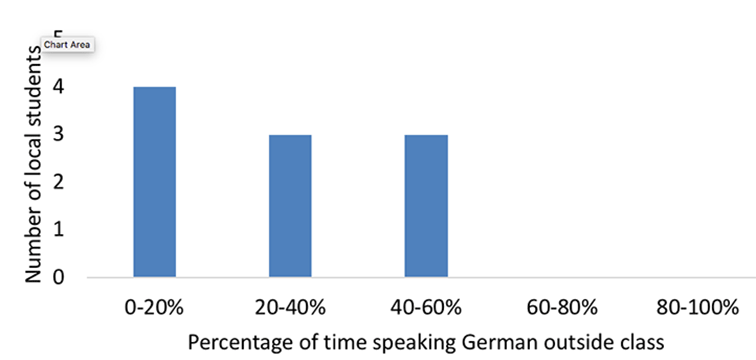
Figure 2. Time local students spent speaking German outside class.
Further findings from the international group indicate:
- Four students mainly spend time with speakers of the same first language or from similar countries as themselves
- Six students spend time with a mixture of first and second language speakers of English; of those six, two-thirds also spend time with people who speak their first language/or are from the same or similar countries as themselves
- Two students do not mention mainly spending time with other speakers of their first language
This reveals that more than half of the international students appear to mostly spend their free time with speakers of their first language. In the local group, only two of the ten students tend to speak with native learners of German or learners of German quite often.
Reasons students gave that hinder speaking outside class
Students were asked to select reasons from a selection of multiple-choice answers. The majority of the students in both language groups claim barriers to speaking the foreign language or intermingling outside class included ‘lack of vocabulary’, ‘feeling shy about making errors’ as well as ‘too much coursework and revision’. Respondents replied to an open question about why they did not speak or socialise much with the target language community outside class. Time pressure, especially too much time needed for study, and lack of opportunities to make friends outside class seem to be the main reasons and reflect the general trend for not intermingling for international students, for example:
There is no time to communicate with native or non-native speakers. I spend all my time to do my homework. There is not even time for independent study (Arabic Speaker).
Because I don’t have friends and there are only two students in my class (Arabic Speaker).
Students of German, living outside German speaking countries, have explained that they have few opportunities to speak the language outside class, for instance:
Apart from classmates and my tutor, I don’t know anyone who speaks German (English L1 and only fluent language).
I have too many assignments and revision (Polish L1. Fluent English and Polish).
No one around me speaks German. Not many people see the value or have the initiative to learn a language (English L1. Fluent Singhalese).
Generally, international students and some local students complain that they are too busy studying to have time to socialise with other students; most local students do not have enough German speaking contacts or opportunities for speaking. Shyness about making errors when speaking and lack of vocabulary are other inhibiting factors for many students in both cohorts, as indicated in multiple choice answers.
Reasons students gave that help speaking outside class
Regarding speaking practice set by tutors for homework, one international student in the EAS cohort reported she spoke English on excursions (as part of her museum project) in a group and set homework. The same Chinese student wrote; ‘English is all around, eating, shopping, etc.’. Another reported going to a conversation group while three out of the four referred to preparing for in-class presentations with classmates. Among the IFP students only two replied that they practised for their presentation and the other four omitted the question. In the local group one student found it beneficial to speak to German speaking friends; seven of the others regretted not having enough German speaking friends to practise with, as they would also find it beneficial. Only one local student speaks German outside class with a peer assistant now considered as a friend. Eight local students practise German with classmates outside class before assessments. Findings show that two students practise German using an App and one has used pronunciation software. These three students may have different concepts of ‘friends’ or may substitute virtual from real friends when practising language.
Importance students attach to speaking languages, friendship and socialising in terms of their future employability
Students’ attitudes regarding employability prospects differ between the cohorts, in that seven local students value speaking practice outside the classroom as very important in terms of future employability chances (Figure 3). However, only two international students rank outside-class speaking practice as very important in this respect. It is significant that in both groups of students they generally think meeting friends from other countries may be quite important to include on a job application for an international post (Figure 4). There is disparity between the ten international and ten local students when considering employment regarding both meeting friends outside class and actually speaking the target language outside class. A larger amount of local students rank this as very important, although five or six of these students in both groups find this quite important (Figure 5).
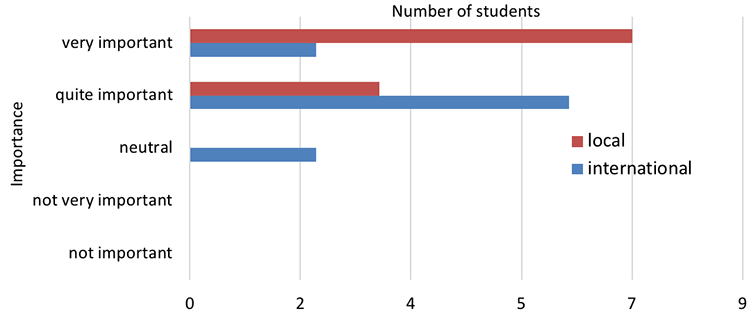
Figure 3. Importance of outside class speaking practice for employability prospects.
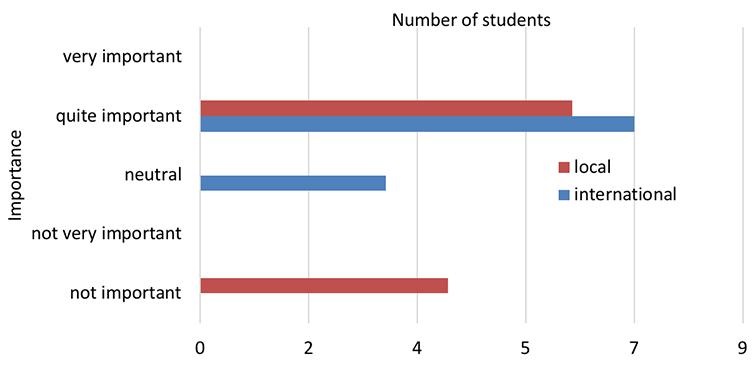
Figure 4. Importance of meeting friends from different countries for employability prospects.
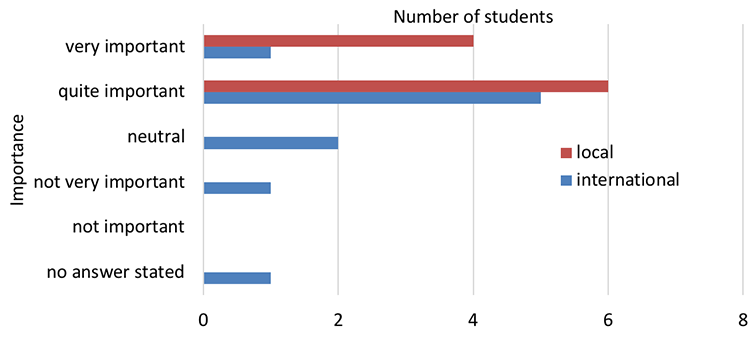
Figure 5. Importance of meeting friends from different countries and speaking the target language for employability prospects.
Local students place more value on speaking the language outside class when it comes to future employability than the international students, despite international students having the advantage of being in the country. In this respect, it seems that in general international students may not always make the most of living in the country, speaking English and intermingling with other people. International students tend to mix more with speakers of their language and of similar nationalities to their own, even though they tend to blame too much work as the main reason for not socialising. The local students in this study say they would like to have more opportunities for face-to-face communication in German outside class and make more German speaking friends, though the opportunities for this are limited.
Suggestions for tutors
Gilbert (2015) suggests developing compassion in group work may be very valuable for language development. Tutors could suggest that students continue their seminar discussions outside class together to report back in class later. Furthermore, vocabulary can be developed during conversations outside class where scaffolding occurs and otherwise could be lost if not extensively practised, although there appears to be no research to suggest scaffolding occurs outside class. Speaking with peer-assistants is seen to be valuable speaking practice also in terms of enhancing employability (Parry, 2015). Tutors could suggest students should meet with their peer assistants outside class to practise for speaking assessments and to socialise generally. Finally, tutors could try to encourage students to join existing conversation groups, or set up new conversation groups and join Student Union societies.
Conclusion
This article reveals that the majority of students in this sample are not spending a great deal of time speaking the foreign language outside class. The main barriers are lack of free time, shyness about making errors and vocabulary limitations. The local students, especially, complain about the lack of German speaking contacts. It remains to be investigated whether those German language students would actually take up opportunities to speak German if available. International students should potentially have more opportunities than local students to speak the target language outside class but some appear not to take advantage of such benefit. A few students have stated that it is helpful if tutors encourage discussions for homework, class excursions, practise for speaking assessments outside class together and speaking with peer-assistants outside class.
Work could also be done in terms of minimising shyness by fostering compassion in group discussion both in and out of class. More vocabulary work could be helpful. The international students in this study do not appear to see much connection or perceive substantial benefit between speaking English outside class, international friendships and future employment possibilities. Tutors could facilitate some discussion among their students to discuss this.
Future study with larger samples would be helpful to gain a wider understanding of students’ foreign language speaking habits outside class. Individual motivation could also be considered in further research on this topic.
Read 'Doing 'being' a primary school teacher...'
References
Crystal, D. (2006) How language works. London: Penguin.
Diamond, A., Walkley, L., Forbes, P., Hughes, T. and Sheen, J. (2011) Global graduates into global leaders. Paper presented by The Association of Graduate Recruiters, The Council for Industry and Higher Education and CFE Research and Consulting. London: CIHE. Available at: http://www.cihe.co.uk/category/themes/key/skills [Accessed: 10 April 2016].
Dunne, C. (2009) ‘Host students' perspectives of intercultural contact in an Irish University’. Journal of Studies in International Education, 13(2), pp. 222-239.
Gilbert, T. (2015) ‘Assess compassion in Higher Education? Why and how would we do that?'. University of Hertfordshire LINK, School of Education, 2(1).
Granott, N. (2005) ‘Scaffolding dynamically toward change: Previous and new perspectives’. New Ideas in Psychology, 23(3), pp. 140-151.
Leask, B. (2009) ‘Using formal and informal curricula to improve interactions between home and international students’. Journal of Studies in International Education, 13(2), pp. 205-221.
Massi, L., Lancey, P., Nair, U., Straney, R., Georgiopoulos, M. and Young, C. (2012) ‘Engineering and computer science community college transfers and native freshmen students: Relationships among participation in extra-curricular and co-curricular activities, connecting to the university campus, and academic success’. IEEE, 10 p. 1.
National Union of Students (2009) Race for Equality.
Parry, J. (2015) Peer Assisted Learning: Pre-sessional English Pilot Scheme to Enhance the Seminar Skills and Subject Specific Language of International Students on the Pre-sessional English Course (PSE): Annual Learning and Teaching Conference 2015. 7 May, 2015, Hatfield:University of Hertfordshire, Learning and Teaching Conference Brochure.
Policarpo, V. (2015) ‘What is a friend? An exploratory typology of the meanings of friendship’. Social Sciences, 4(1), pp. 171-191.
Reynolds-Case, A. (2013) 'The Value of Short-Term Study Abroad: An Increase in Students' Cultural and Pragmatic Competency'. Foreign Language Annals, 46(2), pp. 311-322.
Rienties, B. and Nolan, E. (2014) ‘Understanding friendship and learning networks of international and host students using longitudinal social network analysis’. International Journal of Intercultural Relations, 41, pp. 165-180.
